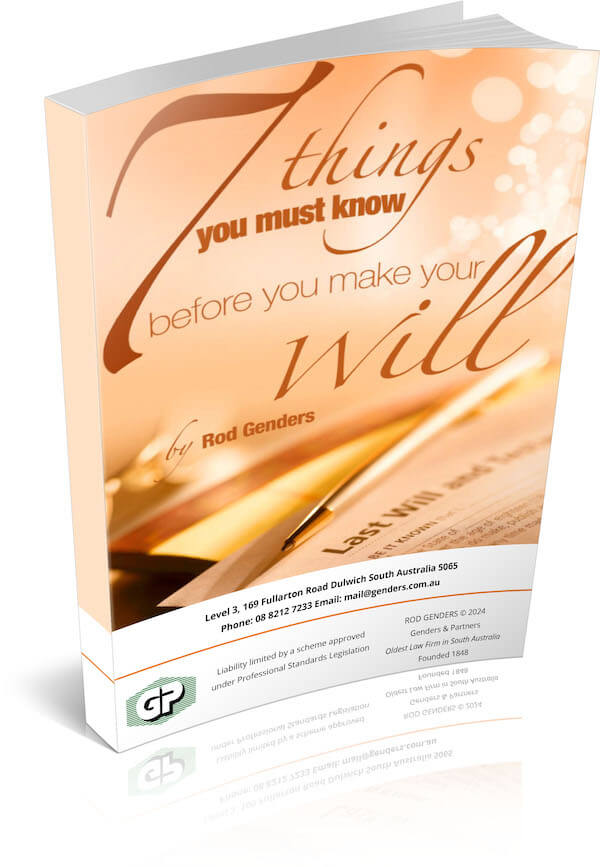
I’ve taken a hammering this week from people misplacing their anger about Wills and estates, and I’m sick of it.
RANT ON:
I’ve just hung up the phone from an otherwise sweet lady, whose 100 year-old aunt had recently died without a Will.
I had to explain to her about the process of applying for Letters of Administration (differing from Probate), and which relatives have priority to do so, and how much the fees and expenses would be.
She was annoyed at the system holding her (and her cousins) back from claiming what they thought they were entitled-to. “It’s too complicated” she cried.
Then there was the chap last week, whose mum died leaving a DIY kit-Will. She was elderly and had someone else handwrite the Will, then she signed it in the presence of her two friends visiting from overseas.
They each used different pens to sign. After the Will was signed she wanted to fit it into a special envelope, but it wouldn’t quite fit, so she cut the sides of the Will to make it fit. This was 25 years ago.
Now the Court is suspicious, because the old lady’s signature was very shaky; she clearly did not write the Will herself; the Will was written with a pen of one ink, and the 3 signatures were all in different inks again.
Many Australian families have been deceived and distressed by the ‘curse’ of a homemade Will (or no Will at all).
While their anger is understandable, it is misdirected at the Court, which is simply trying to protect all estate beneficiaries and creditors.
They should instead be angry at their relative for failing to properly put their affairs in order.
They should also be angry at the publishers and sellers of these expensive pieces of stationery (DIY Will-kits) that lull people into believing that it is easy and simple to make a good and valid Will.
It isn’t and never has been – and in this era of Elder Abuse, it is only getting harder.
While some people get away with a DIY Will without major problems, many don’t. It’s a question of risk versus reward.
The Executor (son) in that matter got frustrated, and blamed the Court. He also had a go at the legal profession – calling on them to “… use their considerable clout, to have these kits stopped…”.
Lawyers and law societies around the country are constantly warning against the dangers of DIY Wills, however there are no votes in it for political parties, so nothing changes.
The kits are not illegal – however this is a specialised area of law, and a Will-maker’s decision to ‘avoid lawyers’ generally costs their family much more than a professionally-made Will would have costed.
To put it another way, most people would not dream of installing their own toilet or air-conditioner, because it can be complicated and can create problems later on.
So why do they think it is a good idea to DIY the most important legal document in their family’s future, especially when any mistakes they make won’t be discovered until it’s too late to fix them inexpensively?
When someone dies without a Will, or leaves a dodgy, bodgy DIY Will, the beneficiaries of that estate are keen to get things sorted as quickly and inexpensively as possible.
Unfortunately for them, theirs is not the only perspective the Court must consider. The closest relatives are typically the ones who stand to benefit from that estate.
In this era of increasing elder-abuse, the Court has learned to be cautious about accepting just the evidence from self-interested parties.
Undue influence, coercion, duress and outright fraud all occur regularly in this jurisdiction, especially with elderly Will-makers who are vulnerable and possibly incapacitated.
While this may not be the case in your family (of course not), the Court does not know your family circumstances, and simply attempts to guard against such matters wherever it sees a possible potential for these issues to occur.
As the Court cannot easily accept the evidence from self-interested parties (ie beneficiaries, which is why independent witnesses to the Will are required in the first place), an Affidavit of Due Execution is requested to satisfy the Court that the testator freely signed the Will and understood its contents.
This adds to the delay and cost of the administration of the estate. In the case above, someone (it turned out to have been the Will-maker herself) had also cut (tampered-with) the original Will after it was signed.
There needed to be contact and correspondence with the attesting witnesses to prove who did what. However -25 years later – the witnesses were themselves now elderly and infirm, and they lived overseas. Substantial extra expense ensues.
Here is a direct quote from a Judge in an Australian Supreme Court:
“On numerous occasions when dealing with a so-called homemade Will, I have observed they are a curse. A homemade Will which utilises what is sometimes known as a ‘Will kit’ is not much better. This case proves the point….” Rogers v Rogers
Kathleen Rogers loved her daughter, Alexandra. Mum’s Will left everything to her. Mum died of cancer when Alexandra was not yet 18. The estate was intended to be held on trust until Alexandra was 25.
Unfortunately, mum’s newsagency Will kit did not agree. The Will was ambiguous as to what ’25 years of age’ meant.
The penny dreadful Will kit cost the daughter $200,000 in Court fees and legal costs to try to fix, all of which comes out of the estate, so 18-year-old Alexandra lost much of her inheritance trying to fix mum’s errors.
Mum could have gone to a specialist law firm and created a professional Will for a mere few hundred dollars.
This is not an unusual case. There are a lot of problems that can arise from people creating Wills without legal support.
Estate Planning is an extremely serious and important process and should be handled by experts.
Estate Planning has many complexities that are not well understood by the public (or even by lawyers who do not specialise in this area of law).
From the Court’s perspective, an elderly person (with a shaky hand) could have been pressured to sign something they didn’t want, or couldn’t understand. This is especially the case when someone else handwrites the Will.
Issues of capacity, and numbers of challenges to Wills and estates, are exploding at present.
The tsunami of increasing dementia issues and the ageing of our population is making the Courts increasingly cautious about Wills in general and DIY Wills in particular.
Don’t forget that the Court does not know your family or the circumstances surrounding the creation and execution of this Will.
A Will must be signed by all 3 persons (testator and both witnesses) at the same time and place. The use of the same pen helps to prove this.
While the use of different pens does not invalidate the Will, some State Courts (and SA is one of them) adopt a protocol where additional proof of the due execution of the Will is required.
The ‘advice’ printed in most Will-kits is poor at best. Further this area of law is State-based, and varies from time to time and from place to place.
I doubt most Will kits mention that. I also doubt they would have performed an up to date review of best practice in each State and Territory before selling their ‘kit’.
However, if you look closely, somewhere in that kit will be a disclaimer that says something like “this is not a substitute for legal advice”, meaning that the publisher wants to protect itself against the inevitable litigation that arises from the use of these types of products.
Ultimately, the beneficiaries of the estate are the ones who must pay for the attempt to fix the deceased’s errors. This is the curse of the home-made Will – that I wish more people understood and avoided.
By the way, even in those small estates where the banks do not require probate, there are still strict formalities that must be completed.
One of our clients just handed over 63 pages of forms sent to her by her mum’s bank, because they are too complex for her to deal-with.
To quote Bishop Desmond Tutu, “There comes a point where we need to stop just pulling people out of the river. We need to go upstream and find out why they’re falling in.”
So quit your bitching about how complicated it is to administer a deceased estate, and stop blaming everybody else.
Take responsibility, and make sure everyone in your family has a well-made and up-to-date, valid, professionally-drawn Will. And do it now – before it’s too late.
RANT OFF.
PS. There are thousands of lawyers in Australia, but very few of them truly specialise in Wills & estates.
Lots of them will ‘have a go’ at making a Will for you, but do you really want to entrust your family’s future to them, or do you want the peace-of-mind that comes from specialist legal advice and representation?
This is a specialised area of law, and if you pay peanuts, you’re likely to get monkeys.
For more information on Wills & estates and creating a modern integrated estate plan to guard against intestacy, or other estate planning topics, contact the oldest law firm in South Australia – Genders and Partners (established 1848 and specialising only in Trusts, Wills and Estates) to explore our articles and visit our website today to schedule your free and convenient telephone consultation!
SPECIAL REPORT “7 Things You Must Know Before You Make Your Will”
In this report you will Learn:

Why home-made Wills can be a LOT more expensive than you might think.
The secret weapons used by the rich & powerful to protect their assets, and transfer their wealth two or three generations ahead.
How Estate and Trustee Companies make BIG money from “free” Wills.
The Most Common Estate Planning Mistakes, how they can cost your family a fortune, and How to Avoid Them.
The Elements of a Sound Estate Plan – why a Will alone is not enough.
How to Make Sure Your Assets Stay in Your Family and are not lost to creditors, lawsuits or ex-spouses.
How to guard against challenges to your Estate after you’re gone.







